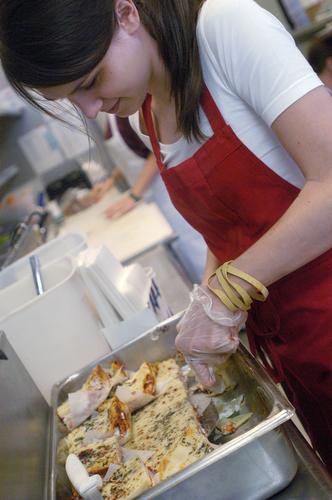University veggies on the rise

Emma Swift, senior in LAS, prepares vegetarian lasagna at Strawberry Fields Restaurant at 306 W. Springfield Ave., Urbana, on Monday. Beck Diefenbach
April 4, 2007
As long as there has been meat to eat, there have been those who abstain, whether on a moral, nutritional, religious or economic basis. These non-meat-eaters, for many years dealt with a difficult task to realistically continue the eating habits that they preferred. Very few restaurants offered vegetarian alternatives. Health-food stores were few and far between. Fast food was out the window as soon as the issue had been raised.
Today, however, a new generation of vegetarian and vegan students and others have helped make being a vegetarian into both a morally and realistically viable choice. Without leaving campus, a vegetarian student can shop for vegetarian food, go to an all-vegetarian restaurant or join a registered student organization created explicitly for campus vegetarians and vegans.
“I first became a vegetarian freshman year of high school,” said Brandy Jezernik, sophomore in LAS. “I still ate chicken and turkey, partially because my doctors told me to, and it was just so much easier to order that stuff at restaurants as well. After learning more about the terrible conditions of animals in factory farms, though, I stopped eating any animal products.”
When Jezernik learned about the conditions in animal factory farms, he stopped eating all animal products, which is considered being, “vegan.” Vegan foods are stricter than vegetarian foods: no food is vegan if it contains any animal products, or is made with animal labor.
University vegetarians and vegans aren’t in it alone. Campus Vegetarian Society, an RSO, offers useful information to make life easy on University students who choose to eat vegetarian. Their Web site offers recipes, arranges support meetings for vegetarians and details information on where to get vegetarian and vegan food anywhere on campus.
Get The Daily Illini in your inbox!
Students visiting there can learn about on-campus restaurants like The Red Herring, the exclusively vegan restaurant located in the basement of the Channing Murray Foundation on Oregon Street. This restaurant, open daily for breakfast and lunch from 8:30 a.m. to 3 p.m., is a local hotbed of vegetarian and other activity. The Red Herring plays host to cutting-edge musical groups, charity functions and is a completely not-for-profit organization.
One of the other most popular vegan eateries and markets on campus is located east of campus. Strawberry Fields, 306 W. Springfield Ave., includes a caf‚ and a connecting health-food store and bakery. Strawberry Fields won “Best Vegetarian Food” from Champaign dining magazine The Octopus for three years straight, and remains one of the most popular vegetarian establishments near campus.
“We’re not actual vegetarians, but we’re vegetarian in spirit,” said Tom Faux, Urbana resident and University professor. “We love Strawberry Fields, and we eat here fairly often. I don’t think very highly of the food industry in the United States, and I’m uncomfortable with the idea that animals bred for food consumption are barely recognizable as animals. I believe in local production and local consumption to the degree possible.”
A quick survey of the caf‚ showed the diversity of its patrons, when it comes to their level of involvement in the vegetarian lifestyle. From being full-fledged meat-eaters, to several patrons who had been raised by their vegetarian parents to have never eaten meat in their entire life, anyone interested in any sort of involvement is welcome.
“I love the atmosphere of this place,” said Emma Swift, senior in LAS who has worked at the caf‚ for several years. “I’ve always loved it; I was a customer here for a year before I ever started working here.”
Swift has been a vegetarian since the age of 12, when she chose to stop eating meat. She admits that the change was extremely difficult, especially since she was living in Germany at the time, where meat is a prominent food.
“My mom was a vegetarian, but she never pressured me into it,” she said. “If you really look at the food industry, it’s hard not to become a vegetarian.”
The food industry, and especially the fast food industry, has always been the biggest culprit of vegetarians and vegans’ accusations of animal abuse and cruelty, but even there, things may be changing.
Burger King, the second largest burger-chain in the world, announced last week a plan to begin to reduce the number of animals it uses from factory farm conditions. Burger King executives announced that they plan to gather two percent of their eggs from non-caged birds, and 10 percent of their pork from sows allowed to roam in pens rather than be confined to cages.
Well-known animal rights groups like People for the Ethical Treatment of Animals applaud this first move towards animal rights.
“The fact that Burger King has made positive changes for some of the animals killed for its restaurants will send a ripple effect through the fast food industry,” PETA spokesman Matt Prescott said.
While it seems unlikely that the world is moving into a golden (or perhaps green) age for vegetarians and vegans, there’s never been a better time to go green.






